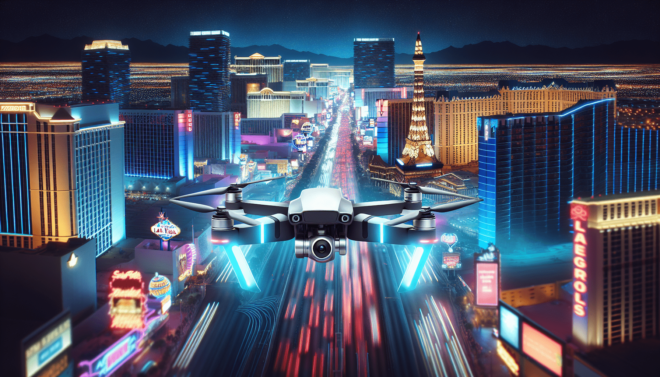Can tourists fly drones over concerts or events in Las Vegas? This is a question you might have if you’re packing your bags with not only your outfits and tickets but also your shiny new drone. With aerial footage and stunning views being all the rage on social media, it’s understandable you’d want to capture your memorable moments in such an iconic city from above. However, before you launch that drone into the sky, it’s crucial to understand the specific rules and regulations involved.
Federal Aviation Administration (FAA) Regulations
Basic FAA Rules for Flying Drones in the US
Before considering any local laws, it’s essential to understand some basic Federal Aviation Administration (FAA) guidelines that every drone operator in the U.S. needs to follow:
- Register Your Drone: Any drone weighing between 0.55 and 55 pounds must be registered with the FAA.
- Operation Permissions: Operators must either fly under the Special Rule for Model Aircraft or follow the rules in 14 CFR Part 107, which covers commercial use.
- Flying Restrictions: Always keep the drone within visual line of sight, and avoid flying over people, moving vehicles, or near emergency response activities.
- Altitude Limits: Never fly above 400 feet in uncontrolled airspace or 100 feet above structures.
- No-Fly Zones: Do not fly in areas where it’s forbidden by FAA ordinances, such as near airports or military bases.
Understanding these rules is the first step because they set the stage for how you can operate your drone nationwide, including in Las Vegas.
Local Laws in Las Vegas
Clark County Regulations
Las Vegas is located in Clark County, Nevada. The local government has its own set of rules and ordinances:
- Permits Required: Clark County requires drone operators to obtain a permit for any drone activity within its jurisdiction.
- Designated Areas: Specific locations have been set aside for recreational drone flying, such as some parks and recreational areas. Always check local listings and signs for approved flying zones.
- Respect Privacy: Ensure you respect residents’ privacy, avoiding flights over private property without permission.
Apart from Clark County, some municipalities within the county, such as North Las Vegas or Henderson, might have their specific rules. Always verify with local authorities to avoid any misunderstandings.
Las Vegas City Ordinances
The city of Las Vegas has not passed any additional ordinances regarding drone use beyond what is regulated by Clark County. However, you still need to follow all federal, state, and county regulations when operating within the city’s boundaries.
Flying Over Concerts or Events
Concerts and Large Gatherings
When it comes to flying over concerts or large gatherings, the situation becomes trickier:
- FAA Restrictions: The FAA explicitly prohibits flying drones over people who are not involved in the operation. Crowded venues like concerts make it practically impossible to comply with this rule.
- Event Organizer Policies: Many event organizers have their own restrictions regarding drone operations. Often, these rules are even more stringent than FAA guidelines.
- Security Concerns: In high-profile events, security protocols usually include a no-fly zone over the venue for any unmanned aircraft to prevent potential threats.
Overall, you can almost always assume that flying a drone over a concert or a large event will not be allowed without special permissions, which are rarely granted to tourists.
Exceptions and Permissions
If you can’t resist capturing that aerial shot, there may be few exceptions, although they are uncommon:
| Activity | Permit Required | Likelihood of Approval |
|---|---|---|
| Media Coverage | Yes | High, if proper credentials and justifications are provided |
| Security Purposes | Yes | High, usually limited to authorized personnel |
| Personal Use | Yes | Low, due to extensive restrictions and safety concerns |
Keep in mind that getting these permissions involves multiple layers of bureaucracy, and each layer has the potential to deny your request.
Penalties for Unauthorized Flying
Legal Consequences
Flying your drone over concerts or events without proper authorization can have severe consequences. Here are some potential penalties:
- Fines: The FAA can impose fines ranging from a few thousand to tens of thousands of dollars for unauthorized drone operations.
- Equipment Confiscation: Law enforcement can confiscate your drone if you violate airspace regulations.
- Criminal Charges: In extreme cases, especially where public safety is compromised, operators can face criminal charges.
Practical Repercussions
Apart from legal penalties, unauthorized drone operations can result in:
- Damage to Reputation: Particularly for influencers and content creators, getting caught violating regulations can harm your reputation.
- Event Disruption: Unauthorized drones can potentially disrupt the event and lead to its cancellation or delay.
- Safety Risks: Accidental crashes or malfunctions can harm attendees, performers, or event structures, leading to severe injuries or damages.
Safe Alternatives
Approved Drone Zones
Las Vegas offers several approved areas where you can legally fly your drone without facing penalties. These zones provide beautiful scenic views and the opportunity for excellent footage:
- Red Rock Canyon: Capture the stunning rock formations and vast open skies.
- Lake Mead: Offers beautiful water views and canyons.
- Mount Charleston: Perfect for scenic mountain and forest shots.
Professional Services
Hiring Drone Services
If filming at an event is a must, consider employing the services of professional drone operators:
- Licensed Operators: They understand all the local and federal regulations, ensuring compliance.
- High-Quality Footage: Professionals often have better equipment and experience, resulting in superior footage.
- Quick Approval: Licensed operators usually have faster access to necessary permits.
Indoor Drone Usage
If outdoor flights are challenging, consider using a drone indoors. Some events may allow indoor drone operations for a more controlled environment:
- Safety Nets: Indoor events often have safety nets to ensure audience safety.
- Less Restrictive: Indoor flights avoid many of the outdoor restrictions, provided the event organizer grants permission.
Steps to Obtain Permission
How to Apply for a Permit
Should you decide to apply for a permit, here’s a step-by-step guide on how to go about it:
Step 1: Prepare Your Documentation
Ensure you have all necessary documents ready, including your drone registration, proof of insurance, and any additional credentials that may support your application.
Step 2: Contact Local Authorities
Reach out to the Clark County Department of Aviation or the event organizers. Utilize official websites or customer service lines for guidance.
Step 3: Submit Your Application
Follow the detailed instructions provided by the authorities. Submit your application electronically, if possible, to save time.
Step 4: NOC from Event Organizers
Obtain a No Objection Certificate (NOC) from the event organizers. They need to verify that your drone operations won’t interfere with their event’s functioning or safety protocols.
Step 5: Wait for Approval
Wait for approval, which could take anywhere from a few days to several weeks. Always follow up if there are any delays.
Appeal Process
In case your application is denied, you have the right to appeal. Here’s how to proceed:
- Review the Denial: Understand the reasons behind the denial to make necessary amendments.
- Prepare Additional Documentation: Gather extra evidence and documentation to support your appeal.
- Submit an Appeal Letter: Write a formal appeal letter and submit it to the relevant authorities.
Drone Insurance
Importance of Drone Insurance
Flying a drone, especially over crowds or valuable infrastructure, necessitates insurance. Here are different types you might consider:
- Liability Insurance: Covers any third-party damages or injuries.
- Hull Insurance: Protects against damage to the drone itself.
- Personal Injury Insurance: Covers injuries to the operator.
- Property Damage Insurance: Covers damages to property caused by the drone.
Choosing the Right Plan
Factors to Consider
When selecting a drone insurance plan, consider the following:
- Coverage Limits: Ensure the amount covered justifies the risk.
- Exclusions: Read the fine print to understand what isn’t covered.
- Premiums: Compare premiums across various providers to find the best deal.
- Claim Process: Ensure the insurance company has a straightforward claim procedure.
Practicing Safe Drone Flying
Pre-Flight Checklist
Before taking off, ensure you complete the following:
- Check Battery Levels: Ensure your drone has enough battery power for the flight.
- Weather Conditions: Verify weather conditions are suitable for flying.
- GPS Signals: Confirm your drone’s GPS system is functioning correctly.
- Propeller Check: Inspect the propellers for any wear or damage.
During Flight
Keep these tips in mind while flying:
- Maintain Visual Contact: Always keep your drone within your line of sight.
- Follow Altitude Limits: Stick to the altitude limits imposed by the FAA (400 feet).
- Avoid Sensitive Areas: Steer clear of restricted or sensitive areas, such as government buildings and crowded places.
- Emergency Protocols: Be prepared for emergencies by knowing how to execute an emergency landing if necessary.
Post-Flight Actions
Data Management
After the flight, secure your data:
- Backup Your Footage: Always backup the footage to ensure you don’t lose any important data.
- Flight Logs: Maintain a log of your flights for future reference and any necessary reports.
- Drone Inspection: Inspect your drone for any damage or wear and tear before storing it away.
Reviewing Legal Compliance
After your flight, double-check:
- Permissions: Ensure all your permissions and approvals are filed properly.
- Incident Reports: File any necessary incident reports if something went wrong.
Drone Technology Advancements
New Features in Modern Drones
Technology is constantly evolving, making drones smarter and safer:
- Obstacle Detection: Modern drones come with advanced obstacle detection systems to prevent crashes.
- Return to Home: Automated return-to-home functions help in bringing drones back safely.
- Extended Battery Life: Newer models have improved battery life, allowing longer flights.
Integration with Smartphones
Many drones now integrate seamlessly with smartphones, providing a user-friendly interface and real-time data display:
- Flight Stats: View real-time flight statistics directly on your phone.
- Live Streaming: Stream live video footage from your drone’s camera.
- Automated Flights: Use app-based automation for predefined flight paths.
Conclusion
In summary, flying a drone over concerts or events in Las Vegas involves navigating through a maze of federal, local, and event-specific regulations. While the idea of capturing incredible aerial footage is appealing, following these rules and securing the necessary permissions can be cumbersome but essential for a legal and safe operation. Always consider alternative ways to capture your memories and enjoy your time in this vibrant city without unnecessary hassles.
Navigating through the regulations can be complex but ensuring you stay compliant will make your experience enjoyable and hassle-free. Happy flying — within the boundaries of the law!

